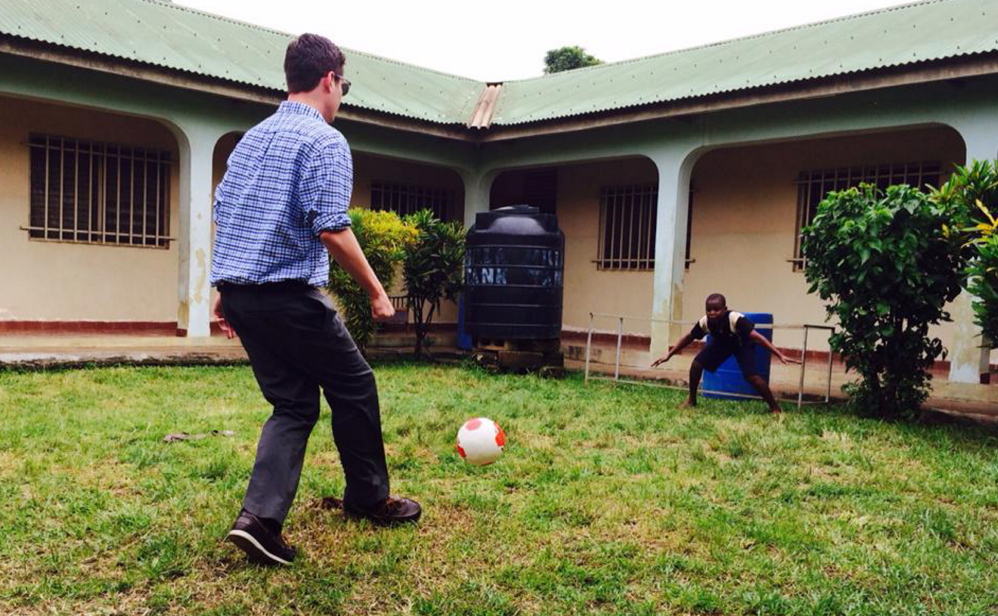Morse High School graduate Gradi R. Schutt had just completed his training in late July and was looking forward to spending the next two years teaching English to children in a developing West African nation.
Those plans changed quickly after the Ebola outbreak widened.
Within days he was a passenger on a flight back to the United States, one among hundreds of Peace Corps’ volunteers who were evacuated to protect them from the health threat posed by the deadly virus.
Schutt said the government in Sierra Leone declared a state of emergency on July 31. The next morning Schutt, who had been training in Bo Town – the nation’s second largest city – was placed on a bus, driven to the airport in the capital, Freetown, and flown back to the United States.
He had arrived in Sierra Leone on June, 16 fully aware that people there had been diagnosed with Ebola. The Peace Corps placed Schutt with a host family in an area that was removed from the regions where there had been an outbreak.
The people of Sierra Leone are very open and welcoming, Schutt said, and it was rare for him to walk down a street and not be accosted by someone asking about what it is like to live in the United States.
Despite the warm reception, the Ebola threat was always on his mind.
The World Health Organization said on Tuesday that out of 1,848 suspected or confirmed cases of Ebola in West Africa, 1,013 people have died so far.
“Speaking for myself, it was nerve-wracking. But on the other hand, I knew I was protected,” he said, noting that he received continuous updates on the spread of the virus from the U.S. Centers for Disease Control and Prevention and the Peace Corps.
“The Peace Corps took great precautions to make sure all their volunteers were protected,” he said.
While his evacuation was orderly, Schutt was surprised at how fast the disease spread and how quickly the government reacted.
After the evacuation, the Peace Corps issued a statement saying it was temporarily removing about 340 volunteers from Liberia, Sierra Leone and Guinea “due to the increasing spread of the Ebola virus.” The organization plans to monitor the outbreak and determine whether it is safe for its volunteers to return.
“It was very disappointing for me because I had set my situation up to be out of the country for two years,” said the 24-year-old Shutt, who lives in Woolwich, near Bath. “But the Peace Corps did the right thing when they evacuated us.”
Schutt agreed to talk about his experience in hopes of dispelling some of the “misinformation” about Ebola that he believes is being reported by some Western media outlets. Schutt emphasized that his views about the situation in Sierra Leone are not those of the Peace Corps.
The biggest myth is how the disease is spread.
“It is not an airborne disease,” he stressed.
The CDC said a person can only get Ebola Hemorrhagic Fever from touching the body fluids of a person who is sick with Ebola or who has died from it. The disease also can be transmitted from exposure to contaminated objects, such as needles, the CDC website says.
The government in Sierra Leone understands the dangers the virus presents and how it spreads, Schutt said, and has put in place measures to safeguard its residents that include segregating Ebola patients from places where large groups gather.
The Ebola outbreak in four African nations, including Nigeria, is the largest in history and the first in West Africa, according to the CDC website.
It is a severe, often fatal disease in humans and nonhuman primates such as monkeys, gorillas and chimpanzees. The virus was discovered in 1976 in what is now known as the Democratic Republic of the Congo. Since then, outbreaks have appeared sporadically.
Schutt, a 2008 graduate of Morse High in Bath and a 2012 graduate of the University of Maine Farmington, joined the Peace Corps to fulfill a desire to perform humanitarian service. He requested an assignment in Africa, a continent he had studied in depth. A political science major, Schutt had concentrated his studies in international conflict management.
Though his girlfriend, Emily Lindsay, and his family were concerned about his well-being, Schutt said, they researched the disease and supported his mission. He corresponded with Lindsay and his family daily through text messaging, emails or by Skype. Lindsay plans to begin her Peace Corps mission in March.
“I would like to go back to Sierra Leone, but if it’s not in the cards, then it is not in the cards,” Schutt said.
Send questions/comments to the editors.





Success. Please wait for the page to reload. If the page does not reload within 5 seconds, please refresh the page.
Enter your email and password to access comments.
Hi, to comment on stories you must . This profile is in addition to your subscription and website login.
Already have a commenting profile? .
Invalid username/password.
Please check your email to confirm and complete your registration.
Only subscribers are eligible to post comments. Please subscribe or login first for digital access. Here’s why.
Use the form below to reset your password. When you've submitted your account email, we will send an email with a reset code.